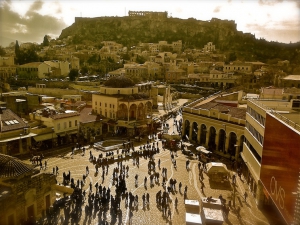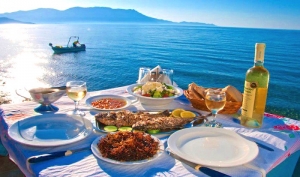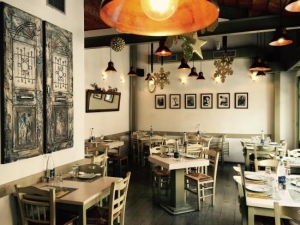BUSINESS CENTRE
XpatAthens
Ithaca
When Odysseus set off for glorious days in Troy, his beloved wife, Penelope, was left alone to unwittingly excite the appetite of men for a gorgeous queen. Before long, the palace was brimful of odious suitors who would flirt with the queen persistently. What is more, they made Penelope promise she would marry one of them.
To keep them at bay, she came up with a devise: she promised she would come to a wedding with the best of them when she had finished weaving a shroud. So, she spent the daytime weaving it and the nighttime unweaving it. Thus doing, she managed to stay clear of the suitors for 20 whole years, until Odysseus returned to Ithaca.
“Keep Ithaca always in your mind. Arriving there is what you are destined for” Cavafy, Ithaca, translated by Edmund Keely/Philip Sherrard
Worldwide famous as the home of Odysseus, Ithaca symbolises the return to the haven; discovery and fulfillment. Despite its proximity to Kefalonia (Cephalonia) (2km northeast) it is much more peaceful, quiet and undiscovered, thus being an ideal place for alternative activities and a holiday living up to the standards of the most demanding among us. With its 27-kilometre long and 6.5-kilometre large mountainous surface, it boasts plenty of hiking as well as mountain bike trails in a sequence of blue and green alongside the coast and through olive, cypress, pine, oak, arbutus and carob trees up on the hills.
Scuba diving and sea kayaking are some of the options too, while the Cave of the Nymph will give you the chance to combine an exciting visit with a myth: Odysseus had hidden there the gifts he had brought along from the land of the Phaeacians.
Beaches
Beach lovers will take pleasure in a multitude of choices covering all tastes, from sand to pebbles, from rocky to green-clad backgrounds, from peaceful to busy ones. Some of them are: Lootsa, Filiatró, Sarakínniko, Dexá, Minnímata, Yidáki, Aetós, Áspros Yalós, Afáles, Kourvoólia.
To read more, please go to visitgreece.gr
Baked Hamburger Patties (Biftekia) With Potatoes
The secret lies in the cooking, which entirely takes place in a clay pot with lid or a similar dish, hence ensuring that the patties won’t dry out and the potatoes will become buttery soft. The tomato sauce adds a bit of flair to the meal and binds the flavours nicely together. I must warn you though that this dish is highly addictive (especially the potatoes), so make sure you have enough for seconds!
Baked hamburger patties (biftekia) with potatoes
INGREDIENTS for 3-4 people as a main dish
• 500g lean beef mince
• 3-4 slices of white bread, about a day old, crusts removed
• 3/4 from a 500ml tin of tomato pulp
• 4-5 large potatoes, peeled and cut lengthwise into thick-ish chips
• Olive oil, oregano, salt, pepper
DIRECTIONS
1. To make the hamburger patties place the bread slices into a bowl of water to soak. If your bread is not old, just toast the slices a bit.
2. In a large bowl combine the beef mince, olive oil, oregano (approx. 1-2 tsp), salt, pepper, 2 tbsp mustard and the bread (squeeze out excess moisture before you use it). Knead everything together. The mixture should be neither too hard nor too soft. If it is too hard, just add s bit more water. If you can eat raw meat, taste the mixture for salt/pepper and adjust seasonings accordingly. Make six fat hamburger patties.
3. Use any type of baking dish you want, as long as it has a tight lid. Spread the potatoes at the bottom of the dish, drizzle with olive oil and season well. Place the patties on top and finish with the tomato puree, some more olive oil and a bit of water (100ml).
4. Preheat the oven to 230 C and bake for 30 minutes. Reduce temperature to 200 C. Open the dish, turn the patties, replace lid and continue baking for another 30 minutes. Remove lid completely and continue baking for perhaps another 20 minutes or until the patties have turned a nice brown colour and there isn’t much water left in the dish. Just make sure not to dry the patties out.
5. Let the dish stand for a bit before serving, as it comes piping hot out of the oven.
Source: Foodjunkie.eu
Greek SYMPOSSIO Organized In 6 Italian Cities
The gastronomical journey that took place in six Italian cities — Milan, Bologna, Pesaro, Rome, Florence and Turin — was possible thanks to the cooperation of tour operator Eden Viaggi and Greek hotel chain Aldemar Hotels. This year’s event was dedicated to Greek cuisine and it took place from February 16 to 26, with the participation of Italian journalists, tour operators and bloggers who work in the field of travel and tourism.
Under the valuable guidance well-known Aldemar Hotels chefs, journalists and tour operators got involved in preparing Greek dishes inspired by the four seasons. Sympossio 2015 opted to present the following Greek dishes: trachanas with mushrooms and cheese for winter, salad with beetroot and baked feta for spring, sea bass a la spetsiota for summer and loukoumades with honey, nuts and ice cream for autumn.
“Our aim is to promote Greek gastronomy as part of our tourist wealth, with the direct participation of journalists from specialized magazines, tourism agencies owners and managers and young bloggers, who promote our country via the Internet,” said Kyriaki Boulasidou, head of the Greek National Tourism Organization office in Italy.
To read more, please visit greekreporter.com
By Ioanna Zikakou
Playing The Athens Tour Guide
Temporary Home Rentals Now Legal In Greece
To read more, please visit: Greek Travel Pages
Athens: Second Best European Destination For 2016
Voting ended on February 10 with more than 288,000 votes for Zadar in Croatia who was elected Best European Destination 2016 and won the prestigious title.
1. Zadar
2. Athens
3. Plovdiv
4. Nantes
5. The Azores Islands
6. Paris
7. Novi Sad
8. Brussels
9. Kotor
10. Milan
To read more, please visit: Greek Travel Pages.
3 Greek Islands Among List Of Places With Best Food In The World
An annual survey conducted by Travel + Leisure gave readers the opportunity to rank their favorite islands not only for their beaches, but also for the quality of restaurants and the food they provide.
The list consisted of 20 islands worldwide and among them were 3 Greek ones famous for their cuisine and fine dining.
Santorini gained 5th position in the list, followed by Mykonos and Crete!
The Travel + Leisure List for Islands with the Best Food
- Nantucket
- St. Bart's
- Maui, Hawaii
- Sicily
- Santorini
- Maldives
- Harbour Island
- Capri
- Hilton Head
- Oahu, Hawaii
- Bali
- Mykonos
- Malta
- Mallorca
- Vancouver Island
- Florida Keys
- Golden Isles
- Crete
- Kauai, Hawaii
- Anguilla
Originally posted on ellines.com
Translated by XpatAthens











